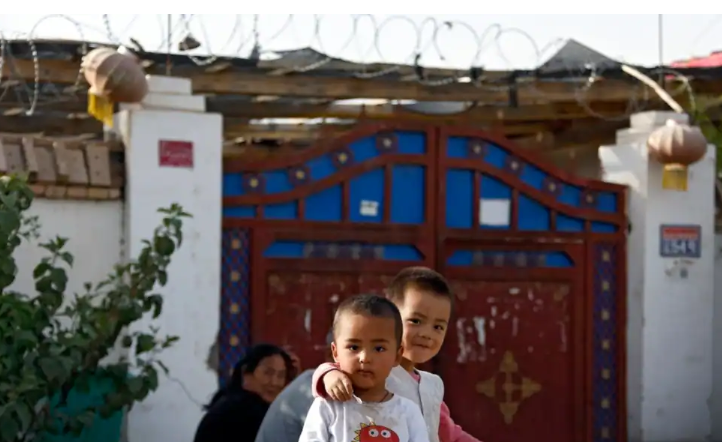Turkish journalists on the China-sponsored Xinjiang tour provide glowing reviews.
Diverging narratives
In a video posted Tuesday by the Chinese Embassy in Turkey, Tunç Akkoç, founder of digital media organization Harici, expressed surprise at what he perceived as a stark contrast between his experience in Xinjiang and the reports from Western media.
“It is totally a different impression and a different reality from what we hear, especially from some Western media,” Akkoç said.
Mustafa Birol Güger of the Cumhuriyet daily newspaper remarked that the smiling faces he observed at an Urumqi bazaar suggested to him that the populace was content.
“If you want to check the level of stress in a country, you should go to public places and look at the face of the people,” Güger said. “In Urumqi, in the grand bazaar today, everyone was smiling, so that means they are happy, and if they are happy, we are happy, too. What I see is completely different from what is being told in the media.”
Asli Atasoy, host of the CGTN Turkish channel’s program “Chasing the Dragon,” on Monday shared a blog post on Turkish news site T24 detailing her visit and an interview with Muhterem Sherif, the imam of the Noghay mosque in Urumqi. CGTN, or China Global Television Network, is a Chinese state-owned media outlet.
Sherif is quoted as saying that Uyghurs “are very satisfied” with the Chinese government’s religious policies.
Opinion shaping
Karluk, the international relations professor, said that with sponsored trips like this, China aims to persuade nationalist and conservative groups in Turkey, traditionally supportive of Uyghur rights, to change their stance.
“China is also attempting to influence more nationalist conservative groups in line with its own discourses by taking them to China as part of packaged programs, particularly given the growing anti-Westernism, especially anti-Americanism, in Türkiye most since 2016,” he said in an email.
Economic compromise
Yalkun Uluyol, a Uyghur rights advocate, views the Chinese sponsorship of Turkish journalists as part of China’s strategy to present a favorable narrative and obscure human rights abuses.
“Similar to previous efforts, China tries to whitewash ongoing abuses and gain international legitimacy,” Uluyol said.
Uluyol argues that Turkey’s concerns for Uyghurs are being overshadowed by economic interests, citing a $1 billion deal with China’s electric carmaker BYD and the resumption of direct flights between Istanbul and Urumqi after an eight-year hiatus as emerging evidence of Turkey’s shift from criticism to accommodation of China’s Uyghur policy.
Turkish journalist Erdal Emre shared his impressions about a recent media tour of the Xinjiang Uyghur Autonomous Region in northwestern China.
“Our #Xinjiang trip with journalist friends from 8 media outlets has concluded. It was a trip where we learned a lot. We will be writing about our impressions. We extend our sincere thanks to our Chinese colleagues for their hospitality,” Emre wrote on the social media platform X on Wednesday.
Emre was part of a group of 11 Turkish journalists who participated in the “Media Trip in Xinjiang: Always More to Discover,” a nine-day event co-sponsored by Guangming Online and the Xinjiang Cyberspace Affairs Commission.
The tour covered Urumqi, Ili, Aksu and Kashgar, cities in the north and south of Xinjiang, with the journalists closely monitored by Chinese authorities.
Guangming Online, the digital arm of the state-controlled Guangming Daily, operates under the direction of the Chinese Communist Party. The Xinjiang Cyberspace Affairs Commission, a regional government department, is responsible for overseeing internet censorship and online content management in Xinjiang.
Image campaign
Guangming Daily reported that the initiative aimed to “vividly showcase a beautiful Xinjiang” marked by “unity, harmony, prosperity, progress, security and ecological well-being.”
Zhang Jun, director of the Xinjiang Cyberspace Affairs Commission, said in the news report that the goal was to counter criticism and promote a positive image of the region.
“We hope that everyone will come to understand Xinjiang through seeing it with their own eyes, tell the story of Xinjiang in different languages, and share a true Xinjiang with the world,” Zhang said in the report.
China’s efforts to host international journalists in Xinjiang are part of its response to allegations of human rights abuses. These allegations include mass detentions, which the U.S. has labeled as genocide and the U.N. as crimes against humanity. Reports indicate that Uyghurs and Turkic Muslims face forced indoctrination, abuse, labor and sterilization in these facilities
This strategy aligns with Chinese President Xi Jinping’s directive from July 2022 to enhance external propaganda efforts. Xi stressed the importance of using various platforms to “tell the story of Xinjiang” and present the region in a favorable light, advocating a multifaceted approach to bolster China’s global influence and shape perceptions of Xinjiang.
According to Abdürreşit Celil Karluk, professor of international relations at Ankara Hacı Bayram Veli University and visiting fellow at the University of Sheffield’s School of East Asian Studies, China strategically spends money to try to influence Turkish public opinion through media channels.
The campaigns target a country that hosts one of the largest and most politically active Uyghur diasporas in the world. Rights groups estimate there are 50,000 to 75,000 Uyghurs living in Turkey.
“Media giants such as CRI Türk and CGNT Türk, which are directly linked to China, broadcast in Turkish 24 hours a day,” Karluk said. CRI Türk is owned by China Radio International, which is a state-owned broadcaster controlled by the Chinese government.













